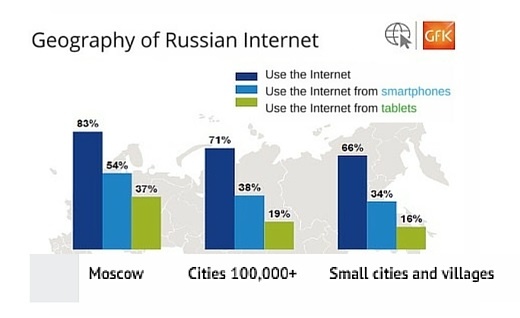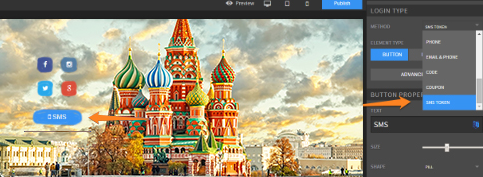In Russian cities, most places offer a public Wi-Fi connection. Still, there is a long way to go before a wireless connection can be provided throughout the entire country.
Russia offers public Wi-Fi to citizens and visitors in the majority of public spaces, particularly in main cities like Moscow and St. Petersburg. Moscow has the highest percentage of hotspots (61%) across the country, offering open networks in subways, airports, train stations, hotels, restaurants, and cafés.

| Source: http://bit.ly/1rgN6PF |
| According to the GFK survey Russian population prefers using smartphones over tablets. Furthermore, the locations in Russia with the largest percentage of internet users is Moscow (83%), followed by cities with more than 100,000 residents (71%), and lastly small towns and villages with (66%). |
| Source: http://bit.ly/1rgN6PF |
|
According to the GFK survey of 2015, internet penetration increased to 70.4% and there are now approximately 84 million internet users in Russia aged 16 and up. That is an additional 4 million users than the previous year. |

In accordance with the RF Government Decree №758 (31 July 2014) and Decree №801 (August 12, 2014), Wi-Fi users must authenticate themselves by SMS verification or by providing a phone number in order to access a public network. Alternatively, users can login by providing a name and a surname to an operator, verified either by the Unified portal of public services (EPGU) or the ID. These methods serve to identify and authenticate Wi-Fi users valid while creating a detailed client database.
As a result of the Wi-Fi in Public Spaces Act of 2016, the Russian Code of Administrative Violations establishes penalties for not authenticating users while using public Wi-Fi. Penalties may vary from 5 to 200 000 Russian rubles for the first violation, and up to 300 000 rubles in case of a repeated violation.
—

Tanaza’s simple and effective verification system guarantees authentication of all public Wi-Fi users, our software is integrated with an SMS gateway that automatically sends a text message when a user submits their mobile number.
The Tanaza built-in splash page features phone based authentication (with SMS verification) and is in compliance with the Russian law.
Related articles:

